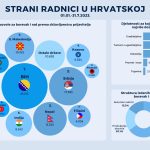”We aren’t immune to what is happening in the countries around us,” respected economic analyst Damir Novotny told HRT when discussing what might lie ahead for Croatia’s already weak economy.
As Poslovni Dnevnik writes on the 12th of September, 2019, all indicators show that the Republic of Croatia is being threatened, not by a sudden recession and then a recovery, but by a long stagnation, believes Damir Novotny. In his view, the crisis will not be great and he doesn’t believe there will be a sharp decline in economic activity, as there was back in 2009.
”There’s increasing talk that a recession is knocking on Croatia’s doors. We’re not immune to what is happening in the countries around us. Are we still in the wake of what happened back in 2008 or are we really in a new crisis?” economic analyst Damir Novotny spoke about this matter on the Studio 4 HRT emission.
”The economy moves in cycles, it’s almost regular, although it cannot be predicted. From World War II up to the 2008 crisis, there were exactly fourteen cycles. Some lasted for less and some for more than 10 years.
The were crises that lasted from six to eight months, sometimes up to twelve months, but never longer than twelve months, only in Croatia and Greece did they last for as long as six years. Croatia and Greece are Europe’s weakest economies, the most vulnerable to external shocks. Unfortunately, Croatian economic policy has still not learned the lessons of 2008. Our economy is still structured to be sensitive to external influences. In the meantime, we’ve integrated with the large markets of Germany and Italy, and that is now exactly what they are experiencing,” said Novotny.
”Speaking of these two economies, those who have become involved in the supply chains of the industries in these countries – the automotive industry, the furniture industry – will feel the most. These could be SMEs that have been well and successfully involved in international supply chains.
Other parts of the Croatian economy are mostly influenced by another type of shocks – financial market shocks, such as the raising of the price of money, no longer being able to finance debt, and the highly indebted public sector, which creates about 55 percent of jobs in Croatia, is particularly at risk. All these external influences can quickly spill over to the extremely vulnerable structure of the Croatian national economy and then more or less affect individual sectors,” Novotny explained.
”In 2008, the public sector was responsible for 40 percent of GDP, which was to reach 80 percent a few years later. Debt increased to maintain employment and the level of wages earned. Now we see that the past few years have been a recovery trend and immediately the public sector is emerging with new demands for wage increases, although productivity itself hasn’t increased.
The private sector is still weak, under-capitalised and unable to withstand the rush of contract shrinkage. For example, if it happens that furniture contractors from Germany reduce their orders for two years, which is what happened in 2008, the woodworking sector will be the first to strike and will simply not be able to survive without work for two years,” says Novotny.
”Stagnation in Croatia will be the result of stagnation in Germany, which is sure to happen, because these small growth rates cannot satisfy us. Croatia will remain at the bottom of the EU with low GDP per capita, and low employment. All of these indicators show that Croatia is threatened, not by a sudden recession and recovery, but by a long stagnation.
“Stagnation will be more difficult because it creates the impression of hopelessness,” Novotny stated.
Make sure to follow our dedicated business page for much more on the state of Croatia’s economy.







